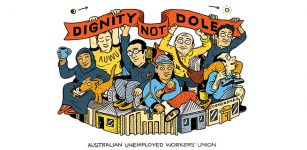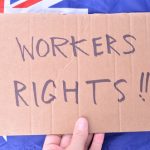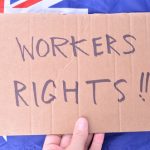Raise the Rate: An Interview With the Australian Unemployed Workers Union’s Jeremy Poxon

The concept of welfare has its basis in 7th century Islam. In its modern European form, welfare provisions began to emerge in the 19th century. These were systems that acknowledged a government’s responsibility to provide for all of its citizens, and in turn, benefit the whole of society.
In the Australian setting, the social security system, which began at the time federation with age and invalid pensions, broadened to the provision of unemployment and sickness benefits in 1945, around the end of World War Two.
But, these days, the idea that welfare provides “social security”, as well as stability, seems lost upon many federal politicians, who bandy about rhetoric that informs the narrative of the dole bludger, while they receive taxpayer-funded daily allowances on par with weekly unemployment benefits.
Going off Department of Social Service figures, the number of people on Newstart and Youth Allowance decreased by 7.3 percent over the 12 months ending in February this year. So, these 63,000 individuals who’ve presumably gone into gainful employment debunk the bludger myth.
Ain’t worth the bludge
This decrease in welfare recipients left 715,560 people still receiving the Newstart allowance, with 544,407 of them on it long-term. And the reason one might hesitate in accusing these people of having a good old time at taxpayers’ expense is that they’re all living well below the poverty line.
For a single adult living alone in 2018, the poverty line sat at $433 a week. However, for a single adult over the age of 22 surviving on Newstart last year, they were receiving $275.10 a week, which means they were struggling on just under $40 a day.
Indeed, as Australian Council of Social Service (ACOSS) chief executive Cassandra Goldie said on Q&A back in 2016, the Newstart allowance has not increased in real terms since the Keating government raised it back in March 1994. And this is still the case.
Newstart replaced the old unemployment benefits in July 1991. It was brought in to address long-term unemployment. However, the obligation requirements and privatisation of job seeking services that accompanied it have long been criticised for stifling recipients’ endeavours to find employment.
It’s way overdue
The Morrison government’s first – and quite possibly last – budget did nothing to address the unemployed. This is despite widespread calls for the Newstart allowance to be lifted. ACOSS is running the Raise the Rate campaign, while GetUp is saying it’s time to Raise Newstart Now.
Established in 2014, the Australian Unemployed Workers’ Union (AUWU) is also advocating for the allowance to be increased. Its members held a demonstration outside treasurer Josh Frydenberg’s office last week calling for Newstart to be raised to the level of the poverty line.
Sydney Criminal Lawyers spoke to AUWU spokesperson Jeremy Poxon about the plight of those on Newstart, the lack of available jobs in this country and the need for an independent oversight body to monitor the social security system.
Firstly, last week’s federal budget did nothing to address the needs of unemployed people. In fact, Newstart has not increased in real terms for the last 25 years.
Jeremy, what’s life like for your average person trying to survive on Newstart today?
Firstly, the vast majority of them are experiencing great social isolation. On Newstart, it’s enough of a mission to just cover household items. So, we hear stories of people not being able to travel to see their families and not being able to socialise with friends.
We were really alarmed to see that a majority of our members are skipping meals every week to try and make ends meet.
We have a national hotline. And every day, we’re hearing how difficult it is for people, not just to keep a roof over their heads and the rent paid, as well as the utilities, but to keep up with the mutual obligations that come with Newstart.
When you’re being paid so little, it’s extremely hard to go to meetings with job agencies, to put fuel in the car or to go out to interviews. If you’re under 30 on Newstart, sometimes you have to do up to 50 hours a fortnight of activities, whether that’s work for the dole or other obligations.
Our members are definitely feeling the squeeze. We’ve got some really worrying reports about some of our members being pushed into homelessness, because the level of Newstart is so low.
Really, across the board, we’re just hearing overwhelmingly that Newstart recipients are struggling to get by.
When asked why the Liberal Nationals government didn’t raise Newstart payments last week, Scott Morrison said the government was busy “getting them into work” instead.
What do you think about this response from the prime minister? How much effort would you say the federal government is putting into trying to get the unemployed into paid work?
Extremely little. We know from the unemployment and underemployment data that they haven’t made a dent in it. If anything, a lot of their job creation is insecure or underemployed job creation. Australia has one of the highest unemployment rates in the OECD.
This is the rhetoric they use to try and justify how miserly Newstart is. They try and paint a picture that they’re creating a lot of jobs, when it’s just not true. There’s over 700,000 people on Newstart.
This government has failed to commit to any meaningful job creation policy to get them into work.
Conservative estimates from the ABS say there’s around eight job seekers competing for every job available. This is a huge pool of people who are structurally locked out of secure work in the labour market.
And rather than look after these people, they’re leaving them on Newstart, which is way below the poverty line. They’re not doing anywhere near enough to resolve the unemployment crisis.
In the meantime, the AUWU, ACOSS and the Business Council of Australia – even John Howard – think it’s their duty to lift the unemployment benefit for those who are locked out of work through no fault of their own.
Over the last quarter of a century that there hasn’t been a real increase in Newstart, the government has placed more restrictions on those receiving these payments, such as mutual obligation requirements.
You’ve already touched on some of them, but besides struggling to live beneath the poverty line, what are some of the other issues that unemployed people receiving payments face?
On top of having the second lowest unemployment benefit in the OECD, Australia also has the toughest compliance, or mutual obligation regime, in the entire OECD.
As I touched on before, this involves forcing people to perform activities up to 50 hours a fortnight, to justify their receipt of income. There’s about 80,000 Australians currently doing work for the dole.
It’s a program I have done. For 50 hours a fortnight I was “working”. But, for absolutely no wages. You do get an extra $10 a week on top of your Newstart. So, that equated to me getting paid about 40 cents an hour to do that labour. That’s one of the more strenuous activities.
There’s obviously the job search requirement: 20 jobs a month. There’s also going to meetings with your job agent and doing job club. There’s a whole range of obligation requirements, which the most vulnerable people in the system always struggle to comply with.
And that’s why we’ve seen lately that a lot of homeless Newstart recipients are getting kicked off the system entirely, because it’s impossible to keep up with these continual demands that are put on them.
Welfare is meant to benefit the whole of society. It aims to provide for those who are out of work, as well as helping the wider community. One reason for this is it’s supposed to avoid an underclass being created who have absolutely nothing and are forced to survive by other means.
But, politicians and AM radio shock jocks like to propagate the idea of the dole bludger. How detrimental would you say this idea and the stigma attached to it is?
It’s incredibly damaging. And it’s been incredibly effective at turning average middle class and working class Australians against unemployed people. And against something that Australia once valued, which was a secure social security system or safety net.
Instead, government and media like to paint unemployed workers as either villains, or drains on the economy, when nothing could be further from the truth.
We know that the vast majority of unemployed Australians want to work. They are desperately trying to work. But, there aren’t enough jobs in the labour market.
That’s why we call ourselves the unemployed workers’ union. We are workers, just like any other. We’re just not having our labour utilised.
That said, the dole bludger narrative persists. And it’s still tactically useful for government, when it wants to achieve surpluses by keeping money from disabled Australians.
But, the narrative is shifting, especially with the Raise the Rate campaign, and as the realities become more well known. Currently, according to ACOSS, about 70 percent of Australians want an immediate raise to Newstart.
It seems like the tide has turned. It’s very hard to continue to propagate the dole bludger narrative when there are stories coming out about how little these people are actually getting to survive.
The most recent Department of Social Services figures show that over the 12 months ending in February this year, the number of people on Newstart dropped by 6.7 percent. This still leaves over 715,000 individuals on it.
In your understanding, are there accessible jobs out there for all those people?
No. And the government doesn’t keep proper track on where these people who fall out of the system go. They like to deliver the rhetoric of they’re creating jobs and that’s where they’ve going. But, they don’t actually know.
In our economy, it’s been like this for decades, as Australia dropped its full employment policy in the mid-70s, where it was government responsibility to make sure the unemployment rate didn’t creep up passed 2 percent.
Back then, when the private market wasn’t delivering enough jobs for people – which currently it isn’t doing – it was considered government responsibility to step in and provide work for those who needed it.
We know there’s a fundamental lack of available work for people. And sadly, the government policy makes this system worse, as, for example, putting 80,000 people on work for the dole sites performing labour essentially for free, actually takes labour away from other low-income Australians trying to find jobs.
How can you compete with somebody who is doing it for nothing?
Rather than fixing this job crisis and making sure there’s enough work for everyone who needs it the government through these punitive policies is actually making the situation much worse for workers trying to find jobs.
The AUWU supports the Social Security Commission Bill 2018. It’s a private member’s bill that was introduced into federal parliament by Independent MP Cathy MacGowan last year.
It’s currently being reviewed by a parliamentary committee. And if passed, it would create the Social Security Commission: a welfare focused advisory body. Why would you say such a body is needed?
There’s an extreme lack of independent oversight of the decisions and reforms that affect the lives of so many Australians.
The employment services system and the reforms that are built into it are able to be quietly trialed on Australians, which the government manages and oversees, before enacting them.
But, there’s no real strong independent body to oversee these reforms that have such a big effect on our members.
For example, the latest bill – which gave job agencies unprecedented powers to punish and dock job seekers of their pay through a demerit point system – created a huge fundamental shift in policy and there was no independent body to check it or deliver meaningful consultation on the decision.
So, we support those measures, because we can’t depend on government departments to understand all of the ramifications of what they put through.
The AUWU is an organisation run by the unemployed for the unemployed. It’s currently running its first ever national training days. Two of these are coming up in Sydney this Sunday and Monday. What will these entail? And why should unemployed people go along and participate?
During budget week, the Coalition didn’t commit to anything for unemployed people. And disappointingly, the opposition didn’t commit to raise Newstart or end work for the dole or scale back mutual obligations.
So, it’s clear we can’t passively rely on government to deliver what we want. And that is a secure and dignified social security network for all Australians.
In the absence of that, what we have to do is organise. And that’s what we’ve tried to do since 2014. We’ve organised ourselves and other unemployed workers.
With this training program we’re partnering up with other groups, like GetUp!, to really bring some new volunteers in. It’s for people locked out of work, who have great skills and passion that are being untapped.
It’s to give them a home, an opportunity to work on some of our campaigns and have them feel involved in the community. It will allow them to do the kind of work that the government really should be doing.
It will also serve to inform the recipients of their rights and try and help them through the system. And we’re also trying to build political power and a voice to influence policy as well.
And lastly, Jeremy, the AUWU is advocating for Newstart to be raised to the level of the poverty line. What sort of impact would you say this would have not only for those on payments, but for the broader community? How would a rise in payments benefit Australia as a whole?
It would obviously have a huge, initial beneficial effect on our members. According to our latest survey, 52 percent of our member base was either homeless or feeling home insecure. So, it would deliver so much financial security for people struggling.
But, broadly, a significant lift to the level of Newstart would really help revitalise local economies and communities, especially those in struggling rural towns where shops are shutting down and people are having to leave.
It would give more economic capacity to people who we know will be spending that money on essentials. It’s not like this money is going to go into people’s bank accounts. These are people who desperately need money to buy essentials.
Giving them that money through entitlements so they can shop locally would be such a boost to economies that really need it.







